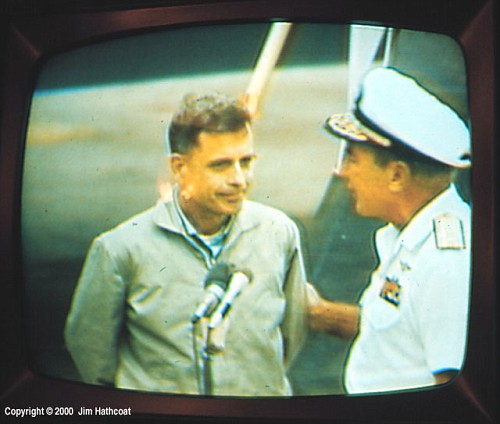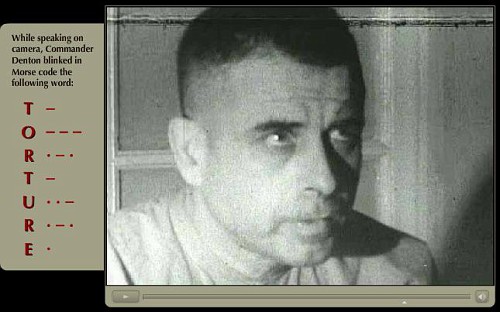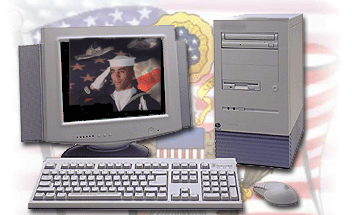| Denton attended McGill Institute and Spring Hill College and graduated from the United States Naval Academy, class of 1947. His 34-year naval career included service on a variety of ships, in many types of aircraft, including airships (blimps). His principal field of endeavor was naval operations. He also served as a test pilot, flight instructor, and commanding officer of an attack squadron flying the A-6 Intruder. In 1957, he was credited with revolutionizing naval strategy and tactics for nuclear war as architect of the "Haystack Concept," while serving on the staff of Commander, Sixth Fleet, as Fleet Air Defense Officer. Denton graduated from the Armed Forces Staff College and the Naval War College, where his thesis on international affairs received top honors by earning the prestigious President's Award. In 1964, he received the degree of Master of Arts in International Affairs from George Washington University. While serving as Naval Aviator during the Vietnam War, Denton was Commanding Officer (CO) of Attack Squadron SEVENTY-FIVE (VA-75) aboard the aircraft carrier USS Independence (CVA 62). On 18 July 1965, then-Commander Denton was flying an A-6A Intruder, Bureau Number 151577, from the Independence with his bombardier/navigator, Lieutenant, junior grade Bill Tschudy, to participate in a bombing mission over the Vietnamese city of Thanh Hoa. Their plane was shot down and the two men were captured by hostile forces. Denton and Tschudy were both held as prisoners of war for almost eight years, four of which were spent in solitary confinement. Denton is best known for the 1966 North Vietnamese television interview he was forced to give as a prisoner, in which he ingeniously used the opportunity to communicate to American Intelligence. During the interview Denton blinked his eyes in morse code to spell out the word "T-O-R-T-U-R-E" to communicate that his captors were torturing him and his fellow POWs. He was also questioned about his support for the U.S. war in Vietnam, to which he replied: "I don't know what is happening, but whatever the position of my government is, I support it fully. Whatever the position of my government, I believe in it, yes sir. I am a member of that government, and it is my job to support it, and I will as long as I live." For his continuous resistance and leadership, even in the face of torture and inhumane conditions, he would be awarded the Navy Cross. While imprisoned, Denton was promoted to the rank of Captain. happening, but whatever the position of my government is, I support it fully. Whatever the position of my government, I believe in it, yes sir. I am a member of that government, and it is my job to support it, and I will as long as I live." For his continuous resistance and leadership, even in the face of torture and inhumane conditions, he would be awarded the Navy Cross. While imprisoned, Denton was promoted to the rank of Captain. Denton was part of a group of about 11 prisoners known as the "Alcatraz Gang", also consisting of George Thomas Coker, George McKnight, James Stockdale, Harry Jenkins, Sam Johnson, James Mulligan, Howard Rutledge, Robert Shumaker, Ronald Storz and Nels Tanner, which was separated from other captives and placed in solitary confinement for their leadership in resisting their captors. "Alcatraz" was a special facility in a courtyard behind the North Vietnamese Ministry of National Defense, located about one mile away from Hoa Lo Prison. In Alcatraz, each of the 11 men were kept in solitary confinement, where cells measured 3 feet by 9 feet and had a light bulb kept on around the clock; the prisoners were locked each night in irons by a guard. CAPT Denton at Clark Air Base, Philippines, after his release as a POW. Finally, on 12 February 1973, both Denton and Tschudy were released from prison along with numerous other POWs. Stepping off the plane as a free man back in his home country, Denton said: "We are honored to have had the opportunity to serve our country under difficult circumstances. We are profoundly grateful to our Commander-in-Chief and to our nation for this day. God bless America." The speech has a prominent place in the 1987 documentary Dear America: Letters Home from Vietnam. profoundly grateful to our Commander-in-Chief and to our nation for this day. God bless America." The speech has a prominent place in the 1987 documentary Dear America: Letters Home from Vietnam. Denton's next assignment, beginning in January 1974, was as commandant of the Armed Forces Staff College (now known as the Joint Forces Staff College). He stepped down as commandant in April 1975 but continued to work at the college until he left the military in June 1977. He retired from the Navy with the rank of Rear Admiral, and would later go on to write the book When Hell was in Session detailing his detention as a POW in Vietnam. The book was later turned into a movie of the same name starring Hal Holbrook. |
Following his retirement from the Navy, Denton accepted a position with the Christian Broadcasting Network as consultant to his friend, CBN founder Pat  Robertson, a position Denton held until 1980. During this time, both Denton and Robertson repeatedly expressed military support for the Contra forces in El Salvador. Robertson, a position Denton held until 1980. During this time, both Denton and Robertson repeatedly expressed military support for the Contra forces in El Salvador. In 1980, Denton ran as a Republican for a U.S. Senate seat from his home state of Alabama and achieved a surprise victory over Democrat Jim E. Folsom, Jr., who had defeated the incumbent, Donald W. Stewart, in the primary. In doing so, he became the only retired admiral to be elected to the United States Senate, as well as the first Republican in modern times to represent Alabama in the Senate. In the Senate, he compiled a solidly conservative voting record. He was featured in a 1981 article in Time Magazine called "The Admiral from Alabama". In 1986, he narrowly lost his bid for reelection to 7th District Congressman Richard Shelby, who later became a Republican in 1994. |







 Lamh Foistenach Abu!
Lamh Foistenach Abu!



![]()




 Lamh Foistenach Abu!
Lamh Foistenach Abu!
 Lamh Foistenach Abu!
Lamh Foistenach Abu!







 Lamh Foistenach Abu!
Lamh Foistenach Abu!
 Lamh Foistenach Abu!
Lamh Foistenach Abu!